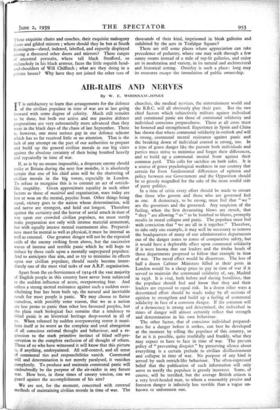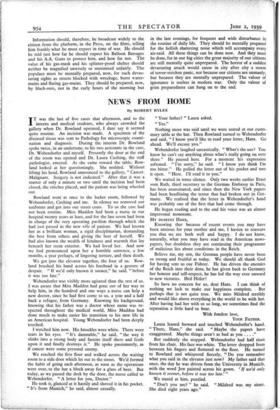AIR-RAIDS AND NERVES
By W. E. WOOSNAM-JONES
IT is satisfactory to learn that arrangements for the defence of the civilian populace in time of war are at last going forward with some degree of celerity. Much still remains to be done, but both our active and our passive defence preparations are very substantially more advanced than they were in the black days of the chaos of last September. There is, however, one most serious gap in our defence scheme which has so far received little or no attention. That is the lack of any attempt on the part of our authorities to prepare and build up the general civilian morale in our big cities against the absolute certainty of their being bombed heavily and repeatedly in time of war.
If, as is by no means impossible, a desperate enemy should strike at Britain during the next few months, it is absolutely certain that one of his chief aims will be the shattering of civilian morale in the big towns, especially in London. To refuse to recognise this is to commit an act of ostrich- like stupidity. Given approximate equality in such other factors as those of materiel and organisation, wars today are lost or won on the mental, psychic front. Other things being equal, victory goes to the nation whose determination, will and nerve are strongest, and hold out longest. Therefore against the certainty and the horror of aerial attack in time of war upon our crowded civilian populace, we must surely make preparation not only with intense material armament, but with equally intense mental rearmament also. Prepared- ness must be mental as well as physical, it must be internal as well as external. Our greatest danger will not be the repeated !aids of the enemy striking from above, but the successive waves of intense and terrible panic which he will hope to induce by those raids upon a mentally unprepared populace. And to anticipate that aim, and to try to minimise its effects upon our civilian populace, should surely become imme- diately one of the most vital tasks of our A.R.P. organisation.
Apart from the ex-Servicemen of 1914-18 the vast majority of English people in this country have never been subjected to the sudden influence of acute, overpowering fear. And unless a strong mental resistance against such a sudden over- whelming fear has been built up, the natural and inevitable result for most people is panic. We may choose to flatter ourselves, with possibly some reason, that we as a nation are less prone to panic than other less favoured peoples, but the plain stark biological fact remains that a tendency to blind panic is an historical heritage deep-rooted in all of us. When released by sudden overpowering terror it mani- fests itself at its worst as the complete and total abnegation of all conscious rational thought and behaviour, and a re- gression to the stark primitive instinct of blind self-pre- servation to the complete exclusion of all thought of others. Those of us who have witnessed it will know that this picture is, if anything, underpainted. All self-control, and all sense of communal ties and responsibilities vanish. Communal will and determination is not merely paralysed, it vanishes completely. To produce and maintain communal panic will undoubtedly be the purpose of the air-raider in any future war. How best, in these times of uneasy tension, can we guard against the accomplishment of his aim?
We are not, for the moment, concerned with external methods of maintaining civilian morale in time of war. The churches, the medical services, the entertainment world and the B.B.C. will all obviously play their part. But the two chief factors which subjectively militate against individual and communal panic are those of communal solidarity and individual conscious preparedness. These at all costs must be fostered and strengthened. Experience in Spain and China has shown that where communal solidarity in outlook and will is strong, communal mental resistance against panic and the breaking down of individual control is strong, too. In a time of grave danger like the present both individuals and parties must strive to minimise and forget their differences, and to build up a communal mental front against their common peril. This calls for sacrifice on both sides. It is a source of grave psychological weakness in our country that certain far from fundamental differences of opinion and policy between our Government and the Opposition should be so grossly magnified for the sake of the more sordid side of party politics.
In a time of crisis every effort should be made to ensure that those who govern and those who are governed feel as one. A democracy, to be strong, must feel that " we " are the governors and the governed. Any suspicion of the feeling, when the first devastating blows are struck, that " they " are allowing " us " to be bombed to blazes, promptly results in moral collapse and panic. The populace must feel with conviction that " we are all in it together." Therefore, to take only one example, it may well be necessary to remove the headquarters of many of our administrative departments out of the danger zones to zones of comparative safety, but it would have a deplorable effect upon communal solidarity if it were known that our leaders and the titular heads of those departments proposed to follow that example in time of war. The moral effect would be disastrous. The loss of half a dozen Cabinet Ministers killed at their posts in London would be a cheap price to pay in time of war if it served to maintain the communal solidarity of, say, Madrid in 1938. It is vital, both before and during hostilities, that the populace should feel and know that they and their leaders are exposed to equal risk. In a dozen other ways a determined effort should be made today by all sections of opinion to strengthen and build up a feeling of communal solidarity in face of a common danger. If the common will of a democracy is strong and determined, the individual in times of danger will almost certainly reflect that strength and determination in his own behaviour.
The other factor, that of conscious individual prepared- ness for a danger before it strikes, can best be developed at the moment by telling the populace of this country, so far as it is possible, quite truthfully and frankly, what they may expect to have to face in time of war. The present policy of " preventing disquiet " by preserving silence about everything is a certain prelude to civilian disillusionment and collapse in time of war. No purpose of any kind is served by such ostrich-like behaviour. The often-expressed belief that the publication of such information will only serve to terrify the populace is grossly incorrect. Some, of course, will be terrified, but the average British citizen is a very level-headed man, to whom a reasonably precise and foreseen danger is infinitely less terrible than a vague un- known or unforeseen one. Information should, therefore, be broadcast widely to the citizen from the platform, in the Press, on the films, telling him frankly what he must expect in time of war. He should be told just how far he should expect his Balloon Barrages and his A.A. Guns to protect him, and how far not. The value of his gas-mask and his splinter-proof shelter should neither be magnified unwisely or minimised unfairly. The populace must be mentally prepared, now, for such devas- tating sights as streets blocked with wreckage, burst water- mains and flaring gas-mains. They should be prepared, now, by black-outs, not in the early hours of the morning but in the late evenings, for frequent and wide disturbance in the routine of daily life. They should be mentally prepared for the hellish shattering noise which will accompany every air-raid. All these things can be done now. And they must be done, for in our big cities the great majority of our citizens are still mentally quite unprepared. The horror of a sudden devastating attack would cause in city after city a storm of terror-stricken panic, not because our citizens are unmanly, but because they are mentally unprepared. The valour of ignorance is useless in modern war. Only the valour of grim preparedness can hang on to the end.











































 Previous page
Previous page